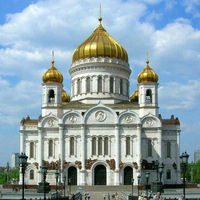Заключение царской семьи в Тобольске.
Церковные службы происходили сперва в доме, в большой зале верхнего этажа. Священнику церкви Благовещения, дьякону и четырем монахиням Ивановского монастыря было разрешено приходить для служения. Но за отсутствием антиминса было невозможно служить обедню. Это было большим лишением для семьи. Наконец 21 сентября, по случаю праздника Рождества Богородицы, всем узникам было впервые разрешено пойти в церковь. Это было большой радостью для них, но подобное утешение они получали впоследствии лишь очень редко.
В эти дни все вставали очень рано и, когда были в сборе во дворе, выходили сквозь маленькую калитку, ведущую в общественный сад, через который шли между двух рядов солдат. Мы всегда присутствовали у ранней обедни и оказывались в едва освещенной церкви почти одни; народу доступ в неё был строжайше запрещён. На пути туда или обратно мне часто случалось видеть людей, которые крестились и падали на колени при проходе Их Величеств. Вообще, жители Тобольска оставались очень привязаны к Царской Семье, и нашим стражам пришлось много раз не допускать стоять народу под окнами и не позволять снимать шапки и креститься при проходе мимо дома.
(Из воспоминаний Пьера Жильяра, преподавателя французского при детях Николая II и воспитателя Цесаревича Алексея)
Церковные службы происходили сперва в доме, в большой зале верхнего этажа. Священнику церкви Благовещения, дьякону и четырем монахиням Ивановского монастыря было разрешено приходить для служения. Но за отсутствием антиминса было невозможно служить обедню. Это было большим лишением для семьи. Наконец 21 сентября, по случаю праздника Рождества Богородицы, всем узникам было впервые разрешено пойти в церковь. Это было большой радостью для них, но подобное утешение они получали впоследствии лишь очень редко.
В эти дни все вставали очень рано и, когда были в сборе во дворе, выходили сквозь маленькую калитку, ведущую в общественный сад, через который шли между двух рядов солдат. Мы всегда присутствовали у ранней обедни и оказывались в едва освещенной церкви почти одни; народу доступ в неё был строжайше запрещён. На пути туда или обратно мне часто случалось видеть людей, которые крестились и падали на колени при проходе Их Величеств. Вообще, жители Тобольска оставались очень привязаны к Царской Семье, и нашим стражам пришлось много раз не допускать стоять народу под окнами и не позволять снимать шапки и креститься при проходе мимо дома.
(Из воспоминаний Пьера Жильяра, преподавателя французского при детях Николая II и воспитателя Цесаревича Алексея)
The imprisonment of the royal family in Tobolsk.
Church services took place first in the house, in a large hall on the top floor. The priest of the Church of the Annunciation, the deacon and the four nuns of the Ivanovo monastery were allowed to come for service. But for the lack of anti-mens, it was impossible to serve the mass. This was a great hardship for the family. Finally, on September 21, on the occasion of the feast of the Nativity of the Virgin, all prisoners were first allowed to go to church. It was a great joy for them, but subsequently they received such comfort only very rarely.
These days everyone got up very early and, when they were assembled in the courtyard, went out through a small gate leading to a public garden through which they walked between two rows of soldiers. We were always present at the early Mass and found ourselves in the barely lit church almost alone; access to it was strictly forbidden to the people. On the way there or back, I often happened to see people who were baptized and fell to their knees when passing through Their Majesties. In general, the residents of Tobolsk remained very attached to the Tsar's Family, and our guards had many times to prevent people from standing under the windows and not to allow them to take off their hats and be baptized when passing by the house.
(From the memoirs of Pierre Gilliard, French teacher with children of Nicholas II and educator Tsesarevich Alexei)
Church services took place first in the house, in a large hall on the top floor. The priest of the Church of the Annunciation, the deacon and the four nuns of the Ivanovo monastery were allowed to come for service. But for the lack of anti-mens, it was impossible to serve the mass. This was a great hardship for the family. Finally, on September 21, on the occasion of the feast of the Nativity of the Virgin, all prisoners were first allowed to go to church. It was a great joy for them, but subsequently they received such comfort only very rarely.
These days everyone got up very early and, when they were assembled in the courtyard, went out through a small gate leading to a public garden through which they walked between two rows of soldiers. We were always present at the early Mass and found ourselves in the barely lit church almost alone; access to it was strictly forbidden to the people. On the way there or back, I often happened to see people who were baptized and fell to their knees when passing through Their Majesties. In general, the residents of Tobolsk remained very attached to the Tsar's Family, and our guards had many times to prevent people from standing under the windows and not to allow them to take off their hats and be baptized when passing by the house.
(From the memoirs of Pierre Gilliard, French teacher with children of Nicholas II and educator Tsesarevich Alexei)

У записи 9 лайков,
0 репостов,
258 просмотров.
0 репостов,
258 просмотров.
Эту запись оставил(а) на своей стене Вероника Вовденко






























